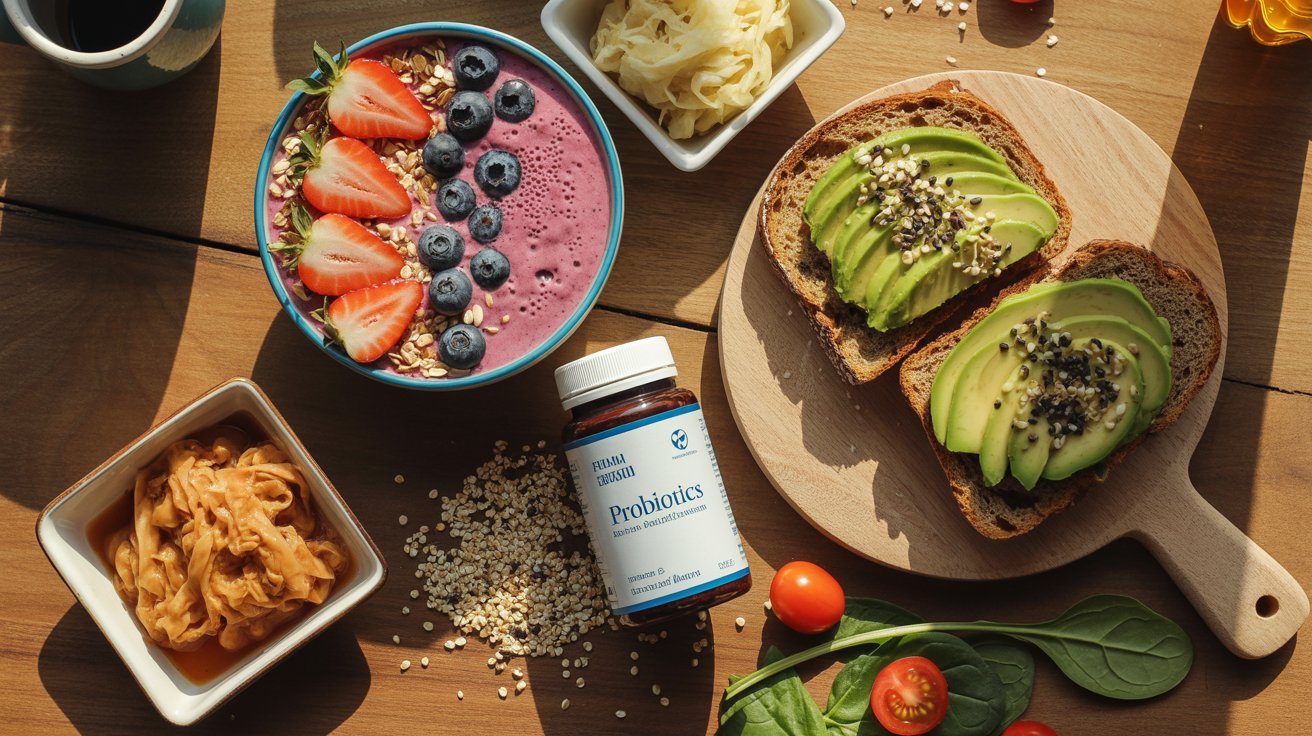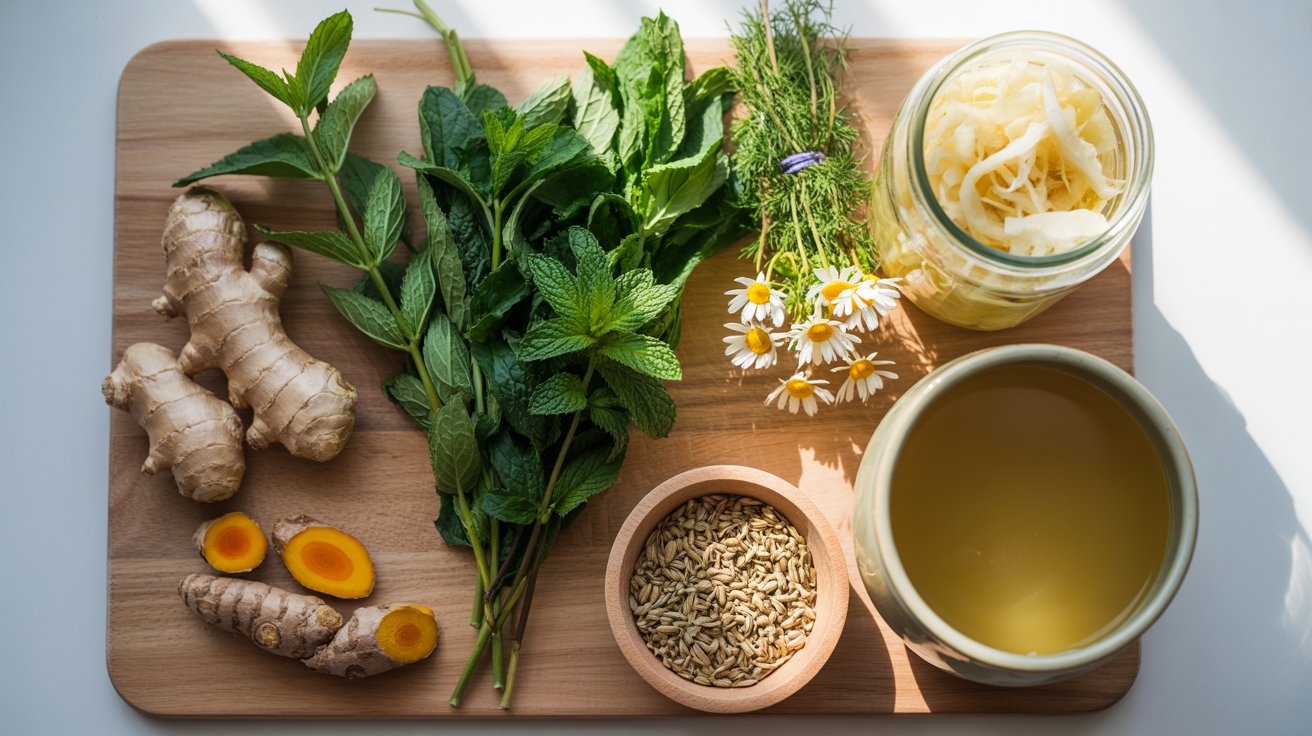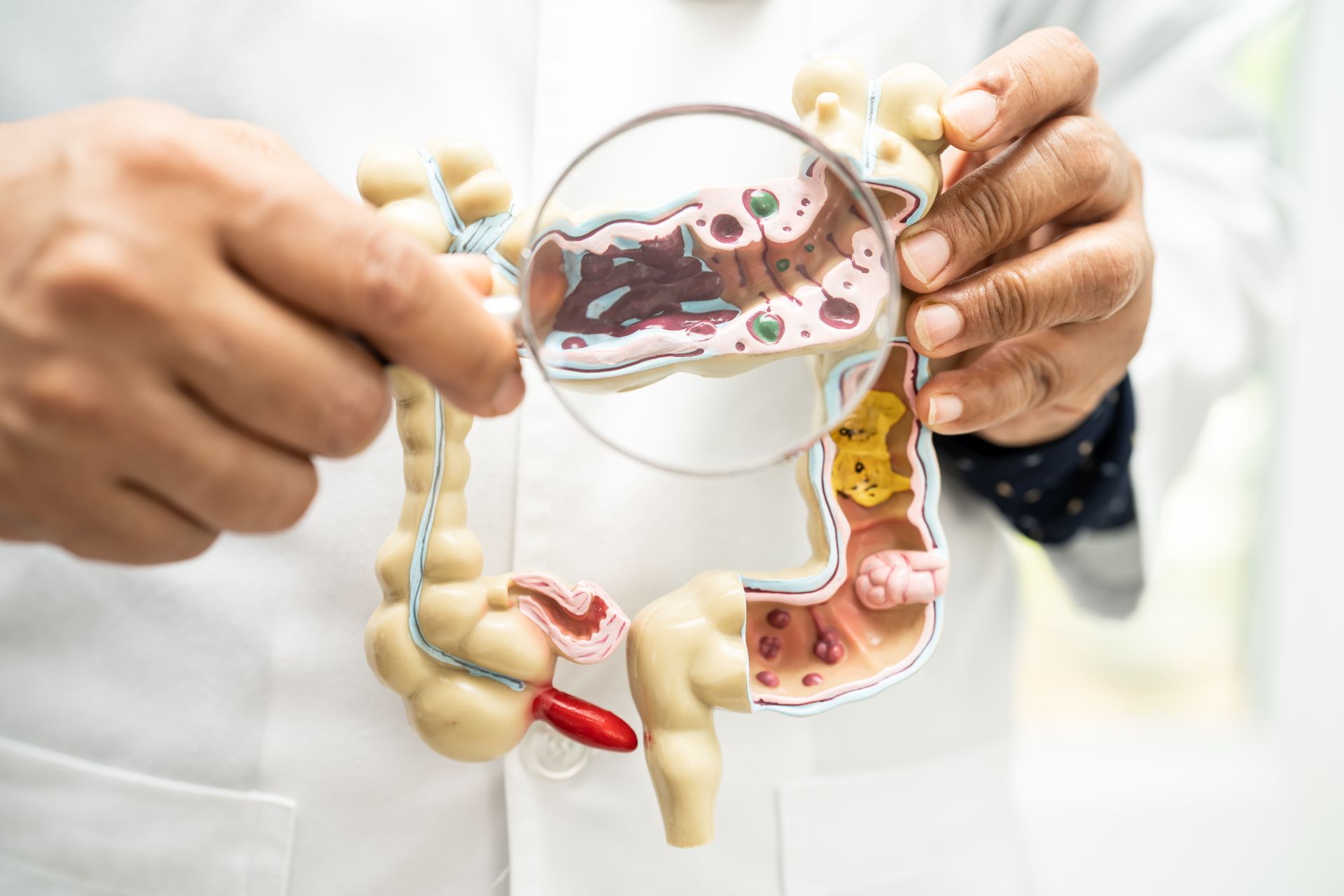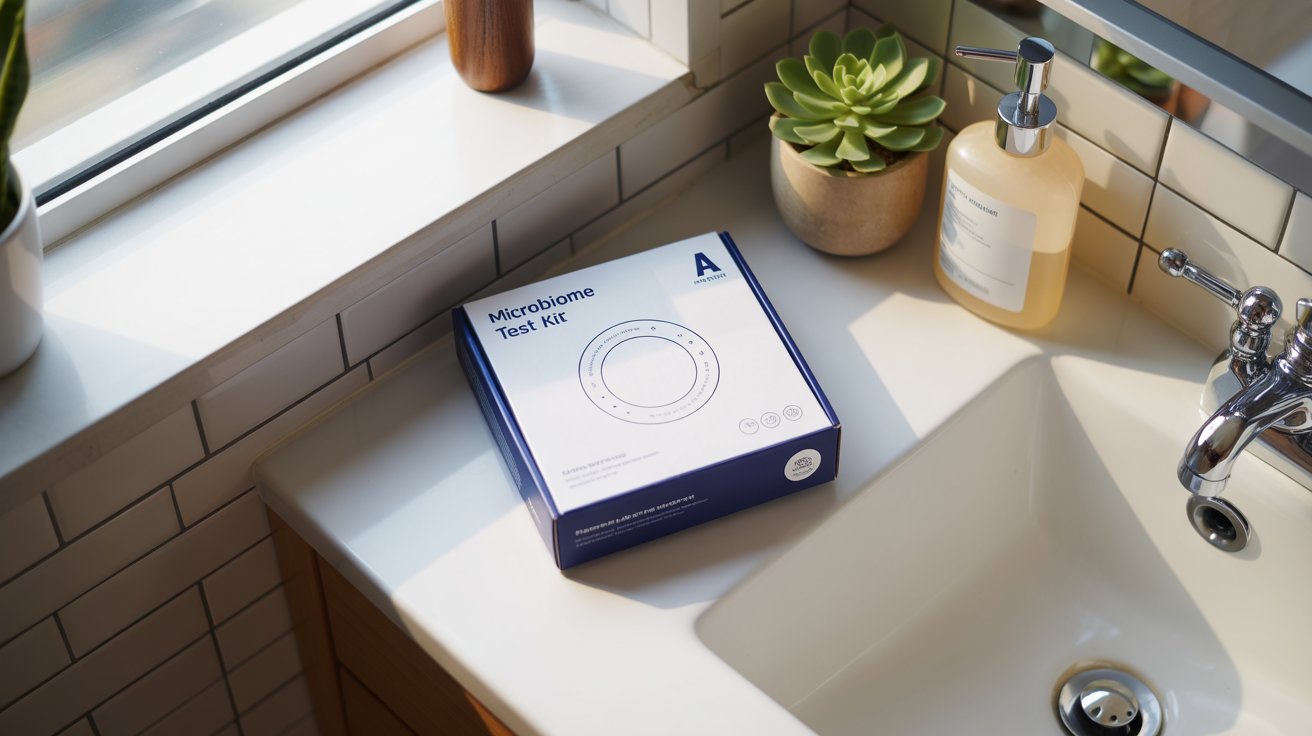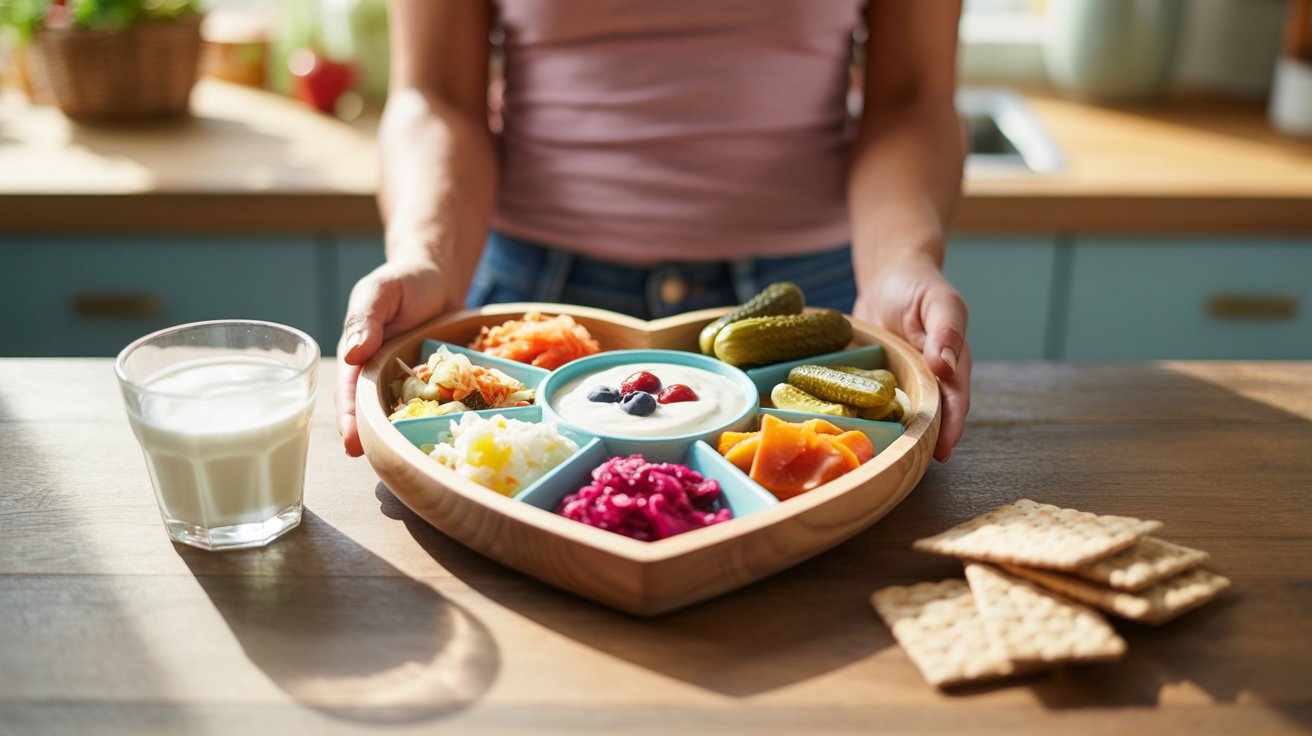Your gut health is a symbol of your overall well-being and sense of belonging. It plays a vital role in your body’s ability to absorb nutrients, fight off infections, and maintain a strong immune system.
If you’re experiencing discomfort, bloating, or other signs of an unhealthy gut, it’s time to take action. With the right support, you can improve and maintain a healthy gut, allowing you to feel your best and fully embrace a sense of belonging.
Discover the best foods, supplements, and lifestyle changes that will support your journey to a healthier gut. Get ready to take control and thrive from the inside out.
What Is The Gut Microbiome
The gut microbiome is an essential collection of microorganisms that reside in your digestive system. These bacteria play a crucial role in your overall health and well-being. They help break down food and extract nutrients that your body needs to function properly.
In fact, the gut microbiome is responsible for producing vitamins and other important compounds that your body can’t produce on its own.
Maintaining a healthy gut microbiome is vital for optimal digestive health. When the balance of bacteria in your gut is disrupted, it can lead to various health issues. The presence of beneficial bacteria in the microbiome helps keep harmful bacteria in check, preventing them from causing harm to your body.
Taking care of your gut microbiome isn’t only important for your digestive health but also for your overall well-being. You can support a thriving gut microbiome and enjoy optimal health by nourishing your body with the right nutrients and incorporating beneficial bacteria through fermented foods.
Signs You Have An Unhealthy Gut
Do you often feel tired and worn out, no matter how much sleep you get? Have you noticed your skin breaking out or experiencing frequent rashes? Have you been struggling with unexplained weight changes or fluctuations? We’ll go over the top signs that your gut may be unhealthy.
Fatigue
If you often experience extreme tiredness and lack energy, it could indicate that your digestive system isn’t in optimal condition. Fatigue is one of the symptoms that can arise when your gut is unhealthy.
Your gut plays a crucial role in your digestive system and overall well-being, including mental health, quality of sleep, and energy levels. When your gut is imbalanced, it can lead to various digestive symptoms, such as bloating, gas, and constipation, further contributing to fatigue.
Skin Problems
When the health of your gut is compromised, skin problems can indicate an unhealthy gut. Your skin reflects your overall well-being, and poor gut health can manifest in various skin conditions.
Inflammatory bowel diseases, such as Crohn’s disease and ulcerative colitis, are associated with skin issues like psoriasis and eczema. Irritable bowel syndrome (IBS) can also contribute to skin problems, including acne and rosacea.
The gut microbiome, which is the collection of bacteria in your digestive tract, plays a crucial role in maintaining healthy skin. When the balance of good and bad bacteria in your gut is disrupted, it can lead to gastrointestinal disorders and skin ailments.
Weight Changes
When your gut isn’t functioning optimally, it can affect your body’s ability to digest and absorb nutrients from your diet properly. This can lead to weight changes that are difficult to explain through other factors, such as physical activity or calorie intake changes.
It’s important to focus on a balanced diet. Incorporating high-fiber foods, such as fruits, vegetables, and whole grains, can promote healthy digestion and help regulate weight. Incorporating sources of probiotics, such as yogurt or fermented foods, can support a healthy gut microbiome and aid in weight management.
Autoimmune Conditions
Gastrointestinal diseases, endocrine disorders, bowel disorders, and cardiovascular disease can all be linked to an unhealthy gut.
A gut that is not healthy can also manifest as allergy symptoms such as skin rashes, hives, or eczema.
Certain Food Intolerances
It’s important to pay attention to your body and the way it reacts to different foods. Diets high in sugar and processed foods can disrupt the balance of healthy bacteria in your gut, allowing harmful bacteria to thrive.
This imbalance can lead to inflammation and damage to your intestinal tract, affecting your gastrointestinal health.
Incorporating probiotic foods into your diet, such as yogurt and sauerkraut, can help restore the balance of bacteria in your gut. Keeping a food diary can also help identify which foods trigger your intolerances and avoid them in the future.
Sugar Cravings
When your gut microbiome is imbalanced, it can lead to sugar cravings. Here are three reasons why an imbalance can trigger your sugar cravings:
- Poor absorption of nutrients: The absorption of essential nutrients can become impaired, leaving your body craving for quick energy sources like refined sugars.
- Harmful Bacteria in Your Gut: The presence of harmful bacteria in your gut can disrupt the balance of your gut microbiome, leading to cravings for sugary foods that feed these microorganisms.
- Disease and inflammation: The imbalance can contribute to chronic inflammation and increase the risk of obesity and diabetes, which can further trigger sugar cravings.
To curb those sugar cravings, it’s crucial to cultivate a balanced gut environment by consuming a healthy diet rich in fiber, probiotics, and prebiotics.
Digestive Problems
Digestive discomfort, gastrointestinal conditions, and abdominal pain are common signs of an unhealthy gut.
How Do You Improve And Maintain A Healthy Gut?
From drinking enough water to adopting habits that promote a balanced gut microbiome, we’ll outline the key methods that are both easy to implement and significantly impact your gut’s well-being. These tips are designed to guide you toward a healthier, more comfortable digestive experience.
Drink Plenty Of Water
Staying hydrated is crucial for improving and maintaining a healthy gut. Here are three important reasons why you should drink plenty of water to support the health of your gut:
- Promotes Digestion: Drinking enough water helps soften the food you eat, making it easier for your gastrointestinal tract to break it down and absorb nutrients. This aids in smooth digestion and prevents constipation.
- Maintains a Balanced Gut Microbiome: Water intake supports the growth of beneficial gut bacteria that contribute to a balanced gut microbiome. These bacteria help in the digestion and absorption of food and also play a crucial role in boosting your immune system.
- Provides Health Benefits: By staying hydrated, you can enjoy numerous health benefits such as improved nutrient absorption, enhanced metabolism, and increased energy levels. Proper hydration also helps flush out toxins from your body, keeping your gut and overall health in check.
Eat A Healthy Diet
Drinking plenty of water to support your gut health also goes hand in hand with eating a healthy diet. A healthy diet plays a vital role in maintaining and improving your gut health. It provides the necessary nutrients for your gut microbes to thrive and promotes bacteria diversity.
To achieve a healthy diet, focus on consuming a variety of food sources such as fruits, vegetables, whole grains, and lean proteins. These foods are rich in absorbable nutrients that are essential for your gut’s well-being.
Incorporating fermented foods like yogurt, sauerkraut, and kefir into your diet can enhance your gut health through the fermentation process.
While supplements can be beneficial, it’s best to obtain most of your nutrients from whole foods to support a healthy gut.
Eat More Fiber
Fiber is essential for the proper functioning of the digestive system and offers numerous benefits for overall health.
Here are three reasons why you should increase your fiber intake:
- Lower risk of colorectal cancer: A diet rich in fiber has been shown to reduce the risk of developing colorectal cancer, a common form of cancer that affects the colon or rectum.
- Maintain a healthy body weight: Foods high in fiber are often low in calories and help you feel full for longer. This can aid in weight management and prevent overeating.
- Regulate blood sugar levels: Fiber slows down the absorption of sugar in the bloodstream, preventing rapid spikes in blood sugar levels. This can be particularly beneficial for individuals with diabetes or those at risk of developing it.
Probiotics
Probiotics are living microorganisms that, when consumed in adequate amounts, provide health benefits to your gut. They’re commonly found in fermented foods like yogurt, sauerkraut, and kefir. People have been consuming probiotics for centuries, recognizing their positive impact on human health.
These beneficial bacteria help maintain a healthy microbiome by fighting off harmful bacteria and supporting the immune system. In a healthy individual, trillions of bacteria reside in the gut, forming a diverse ecosystem. However, factors such as stress, poor diet, and environmental toxins can disrupt this delicate balance.
Prebiotics
Prebiotics are a type of dietary fiber that promote the growth and activity of beneficial bacteria in your gut.
Here are three ways prebiotics can benefit your gut health:
- Enhanced nutrient absorption: Prebiotics help improve the absorption of essential nutrients, such as calcium and magnesium, by promoting a healthy bacterial colonization process in your gut.
- Reduced risk of chronic illnesses: Studies have shown that a healthy gut microbiome, supported by prebiotics, can reduce the risk of chronic illnesses like heart disease, cancers, and cardiovascular disease.
- Better overall well-being: By nourishing your gut microbiome, prebiotics can positively impact your overall health condition. They’ve been linked to improved digestion, better quality of sleep, and increased physical activity.
Incorporating prebiotics into your diet can have a significant impact on your gut health and overall well-being.
Reduce Stress
In our quest for optimal gut health, managing stress is a crucial component. Stress can have a profound impact on digestive well-being, influencing everything from gut bacteria balance to overall gut function.
We’ll go over some practical and effective strategies to reduce stress, thereby fostering a healthier gut. These methods range from lifestyle changes to dietary adjustments, each playing a significant role in enhancing your gut health.
- Regular Exercise: Engage in physical activities like walking, jogging, yoga, or tai chi to relieve stress and promote gut health.
- Mindfulness and Meditation: Practice mindfulness and meditation to reduce stress levels and positively impact gut health.
- Adequate Sleep: Ensure 7-9 hours of quality sleep per night to manage stress and support gut health.
- Balanced Diet: Eat a diet rich in fiber, fruits, vegetables, and probiotics, and limit processed foods and sugars for better gut health.
- Hydration: Drink plenty of water to aid digestion and reduce stress-related gut symptoms.
- Deep Breathing Exercises: Use deep breathing techniques to activate the body’s relaxation response and potentially improve gut health.
- Time Management: Effectively manage your time to reduce stress and avoid feeling overwhelmed.
- Connecting with Others: Engage in social activities and spend time with loved ones to improve mood and reduce stress.
- Limiting Caffeine and Alcohol: Consume caffeine and alcohol in moderation to avoid increasing stress and disrupting gut health.
- Seek Professional Help if Needed: Consider therapy or counseling if stress becomes overwhelming, for strategies to manage it more effectively.
Eliminate Sugar And Processed Foods
Eliminating sugar and processed foods from your diet can positively impact many aspects of your health, including your body’s overall function and sleep quality.
Reduced inflammation: Sugar and processed foods can cause inflammation in the gut, leading to discomfort and pain. By eliminating these foods, you can reduce inflammation and promote a healthier gut.
Improved digestion: Sugar and processed foods can disrupt the balance of beneficial bacteria in your gut, affecting digestion. Removing them from your diet allows your gut to function optimally and improves digestion.
Lower risk of chronic diseases: Excessive sugar intake and a diet high in processed foods have been linked to chronic diseases like obesity, diabetes, and even chronic kidney disease. By eliminating these foods, you can lower your risk and promote better overall health, including brain function.
Mindful Eating
For mindful eating that supports gut health, focus on incorporating nutrient-dense foods into your diet while being present and aware of your eating habits. Nutrient-dense foods are rich in essential vitamins, minerals, and amino acids that promote a healthy gut.
These nutrients aid in the breakdown of food and the production of important acids that support digestion and overall gut health.
Eat Smaller Meals More Often
By eating smaller meals more often, you can support your gut health and improve digestion. Here are three reasons why this approach can benefit you:
Improved digestion: Eating smaller meals more frequently allows your body to process food more efficiently. It can help prevent bloating, indigestion, and discomfort.
Stable blood sugar levels: Consuming smaller, balanced meals throughout the day can help regulate your blood sugar levels. This can lead to increased energy levels and improved mood.
Enhanced nutrient absorption: When you eat smaller meals, your body can effectively absorb the nutrients from the food you consume. This can provide your body with the necessary vitamins, minerals, and anti-inflammatory nutrients it needs to support your gut health.
Exercise
Exercise isn’t only beneficial for your physical fitness, but it also plays a crucial role in promoting a healthy gut.
When you engage in regular physical activity, you stimulate the movement of food through your digestive system, aiding in the efficient absorption of nutrients and the elimination of waste. This helps to maintain a balanced and healthy gut microbiome.
Exercise has been shown to increase the diversity of beneficial bacteria in the gut, which can have long-term positive effects on your overall health.
Make it a priority to include regular exercise in your daily routine to support your gut health. Your care team, including your active bacteria and gut organisms, will thank you for it.
Reduce Alcohol And Caffeine
By reducing alcohol and caffeine intake, you can create a less acidic environment in your gut, allowing the beneficial microbes in your microbiota to flourish.
Alcohol and caffeine can disrupt the balance of your gut microbiota, leading to an overgrowth of harmful bacteria and a decrease in beneficial microbes.
Excessive alcohol consumption has been linked to an increased risk of colon cancer, while caffeine can irritate the lining of the gut, causing inflammation.
By reducing alcohol and caffeine, you can create a more favorable environment for the growth of beneficial microbes, which play a crucial role in supporting your overall gut health.
Consider replacing alcohol and caffeine with healthier alternatives or opting for a prebiotic supplement to further support your gut health.
Add More Foods With Collagen
Collagen is a protein that plays a crucial role in maintaining the health of your gut lining. It helps to strengthen the barrier between your gut and the rest of your body, preventing harmful substances from entering your bloodstream.
Foods rich in collagen include bone broth, fish, poultry, and leafy greens. Adding these foods to your meals can provide your body with the necessary building blocks to support a healthy gut.
Collagen also supports the growth of beneficial bacteria in your gut, such as anaerobic bacteria, which help with digestion and nutrient absorption.
Best Foods For Improving Gut Health
If you want to improve your gut health, there are several foods you should consider incorporating into your diet.
Leafy Greens
Leafy greens, such as spinach and kale, are packed with fiber. This helps promote regular bowel movements and prevents constipation, keeping your gut healthy and functioning properly.
They are a great source of vitamins, minerals, and antioxidants that support the growth of beneficial bacteria in your gut, helping to maintain a diverse and balanced gut microbiome. They also contain compounds that have anti-inflammatory effects in the body.
Garlic
Garlic contains prebiotic compounds that serve these beneficial bacteria, helping them thrive and promote a balanced gut microbiome. Garlic also has antimicrobial properties that can help combat harmful bacteria in your gut.
Including garlic in your diet can also help reduce inflammation and boost your immune system, further supporting your overall gut health. Add a clove or two of garlic to your favorite dishes and give your gut the support it needs.
Nuts
Nuts aren’t only delicious but also offer numerous health benefits. Nuts, such as almonds and walnuts, are packed with dietary fiber. Fiber helps regulate bowel movements and promotes a healthy digestive tract.
They also contain monounsaturated and polyunsaturated fats, which help reduce inflammation and support the growth of beneficial gut bacteria.
They are loaded with antioxidants, such as vitamin E and selenium. These antioxidants protect the gut from damage caused by harmful free radicals.
Kefir
Kefir contains live bacteria and yeast that can benefit your gut by promoting a healthy balance of microorganisms.
By consuming kefir regularly, you can support the growth of beneficial bacteria in your gut, enhancing digestion and boosting your immune system. It’s also rich in vitamins, minerals, and protein, making it a nutritious addition to your diet.
Avocado
Like most foods on this list, avocado is an excellent source of dietary fiber, which helps promote regular bowel movements and prevent constipation. Fiber also acts as a prebiotic, feeding the beneficial bacteria in your gut.
Avocados are rich in monounsaturated fats, which are known for their anti-inflammatory properties. They are packed with vitamins, minerals, and antioxidants that nourish your gut and boost your immune system. It contains vitamins C, E, and K, potassium, and folate.
Whole Grains
Whole grains, such as oats, brown rice, and quinoa, are rich in fiber and nutrients that benefit your gut.
The fiber found in whole grains acts as a prebiotic, providing nourishment for the good bacteria in your gut. This helps maintain a healthy balance of bacteria and improves overall digestion. Whole grains also contain vitamins, minerals, and antioxidants that contribute to a healthy gut environment.
Chocolate
While it may seem surprising, chocolate, when consumed in moderation, can positively affect your gut health.
Dark chocolate contains a significant amount of dietary fiber. Chocolate, especially dark chocolate with a high cocoa content, is packed with antioxidants. These compounds help reduce inflammation in the gut and protect the gut lining from damage caused by free radicals.
Chocolate is also known to increase the production of serotonin, a neurotransmitter that plays a crucial role in regulating mood. When you feel good, your gut feels good, too, as the gut and brain are closely connected.
Kombucha
Kombucha is a fermented tea that contains live bacteria and yeast, making it a probiotic-rich beverage. It also contains organic acids, such as acetic acid and gluconic acid, which can improve nutrient absorption and support overall gut health.
Kombucha is a natural source of antioxidants, which can reduce inflammation and protect against oxidative stress in your gut.
Oily Fish
Not only are these fish delicious, but they’re also packed with nutrients that your gut will love.
Oily fish like salmon, mackerel, and sardines are rich in omega-3 fatty acids. These essential fats have anti-inflammatory properties that can reduce gut inflammation and promote a healthy gut environment.
Fish is an excellent source of vitamin D, which plays a crucial role in maintaining a healthy gut lining. A strong gut lining is essential for proper nutrient absorption and protection against harmful bacteria.
Oily fish is also a great source of high-quality protein. Protein is necessary for repairing and rebuilding tissues, including the gut lining. It also helps keep you fuller for longer, reducing the risk of overeating and promoting a healthy weight.
How Your Gut Affects Every Part Of Your Body
Your gut impacts every part of your body, from your immune system to your mental health. It isn’t just responsible for digesting food and is crucial in maintaining your overall well-being.
The health of your gut affects your immune system, as around 70% of your immune cells reside in your gut. A healthy gut helps fight off infections and protects you from various diseases.
Furthermore, your gut has a strong connection with your mental health. The gut-brain axis is a bidirectional communication pathway between your gut and brain. This means that the health of
your gut directly influences your mood, emotions, and even cognitive function. A healthy gut can help reduce symptoms of anxiety, depression, and stress.
Your gut also plays a vital role in nutrient absorption. It breaks down food and absorbs essential nutrients that your body needs to function properly. If your gut isn’t functioning optimally, it can lead to nutrient deficiencies and various health issues.
Why Take Probiotics?
Probiotics are live bacteria and yeasts that are beneficial for your digestive system. They can help restore the balance of good bacteria in your gut, which is essential for proper digestion and overall well-being.
Probiotics help break down food and absorb nutrients more efficiently, which can reduce symptoms of bloating, gas, and constipation. They also support the production of digestive enzymes, aiding in the breakdown of complex carbohydrates, proteins, and fats.
Probiotics help strengthen the gut barrier, preventing harmful bacteria from entering your bloodstream and causing infections. By promoting a healthy gut, probiotics can enhance your immune response and reduce the risk of illnesses.
The gut-brain connection is a powerful one. Probiotics have been shown to influence the production of neurotransmitters like serotonin, which plays a crucial role in mood regulation. Taking probiotics can improve mental well-being and a more positive outlook on life.
Take a look at the table below to understand how certain probiotics can benefit the health of your gut:
| Probiotics | Benefits | Food Sources |
|---|---|---|
| Lactobacillus | Supports gut health and can help with diarrhea and lactose intolerance | Yogurt, kefir, sauerkraut, tempeh, kimchi |
| Bifidobacterium | May improve IBS symptoms, supports immune function, and reduces inflammation | Milk, yogurt, some cheeses |
| Saccharomyces boulardii | A yeast probiotic that can combat diarrhea and other digestive problems | Supplement form (not typically found in foods) |
Why Take Prebiotics?
While probiotics are beneficial bacteria that support the digestive system, prebiotics are non-digestible fibers that act as food for these healthy bacteria. By consuming prebiotics, you provide nourishment to the beneficial bacteria in your gut, allowing them to thrive and maintain a healthy balance.
To help you understand the importance of prebiotics, let’s take a look at the table below:
| Prebiotics | Benefits | Food Sources |
|---|---|---|
| Inulin | Promotes gut health by enhancing beneficial bacteria growth | Chicory root, onions, garlic, leeks |
| Fructooligosaccharides (FOS) | Increases the production of short-chain fatty acids | Bananas, asparagus, artichokes, oats |
| Galactooligosaccharides (GOS) | Improves the absorption of minerals | Legumes, lentils, chickpeas |
Including these prebiotic-rich foods in your diet can support the growth of beneficial bacteria and improve gut health.
When To Contact a Healthcare Provider
If you experience persistent or severe symptoms related to poor gut health, it’s important to contact a healthcare provider for further evaluation and guidance.
Several signs indicate when it’s time to contact a healthcare provider. If you frequently experience digestive issues such as bloating, gas, diarrhea, or constipation that persist for an extended period, it may be a red flag for underlying gut health problems.
If you notice unexplained weight loss, fatigue, or a significant change in your appetite, it’s essential to seek medical advice.
If you have been diagnosed with a chronic condition such as irritable bowel syndrome (IBS), inflammatory bowel disease (IBD), or celiac disease, you will need to have regular check-ups with your healthcare provider. These conditions can significantly impact your gut health and may require ongoing management and treatment.
Frequently Asked Questions
Can Stress and Anxiety Affect Gut Health?
When you’re under stress, your body releases hormones that can disrupt the balance of bacteria in your gut, leading to digestive issues like bloating and diarrhea. Stress can also affect the functioning of your immune system, making you more susceptible to gut infections.
How Does Poor Gut Health Impact Mental Health?
The gut and brain are connected through a complex network of nerves and chemicals, so when your gut is unbalanced, it can disrupt the communication between your gut and brain, affecting your mental well-being. If your gut isn’t functioning properly, it can lead to inflammation in the body, which has been linked to mood disorders like anxiety and depression.
Are There Specific Exercises or Activities That Can Improve Gut Health?
Activities like walking, jogging, yoga, and even dancing can all contribute to improved gut health. Remember to listen to your body and find activities you enjoy, as this will help you stay motivated and make it easier to incorporate into your routine.
Can Gut Health Affect Skin Conditions Like Acne or Eczema?
Gut health plays a role in skin conditions like acne or eczema. Your gut and skin are connected, so when your gut is out of balance, it can affect your skin. Poor gut health can lead to inflammation, which can trigger skin issues.

